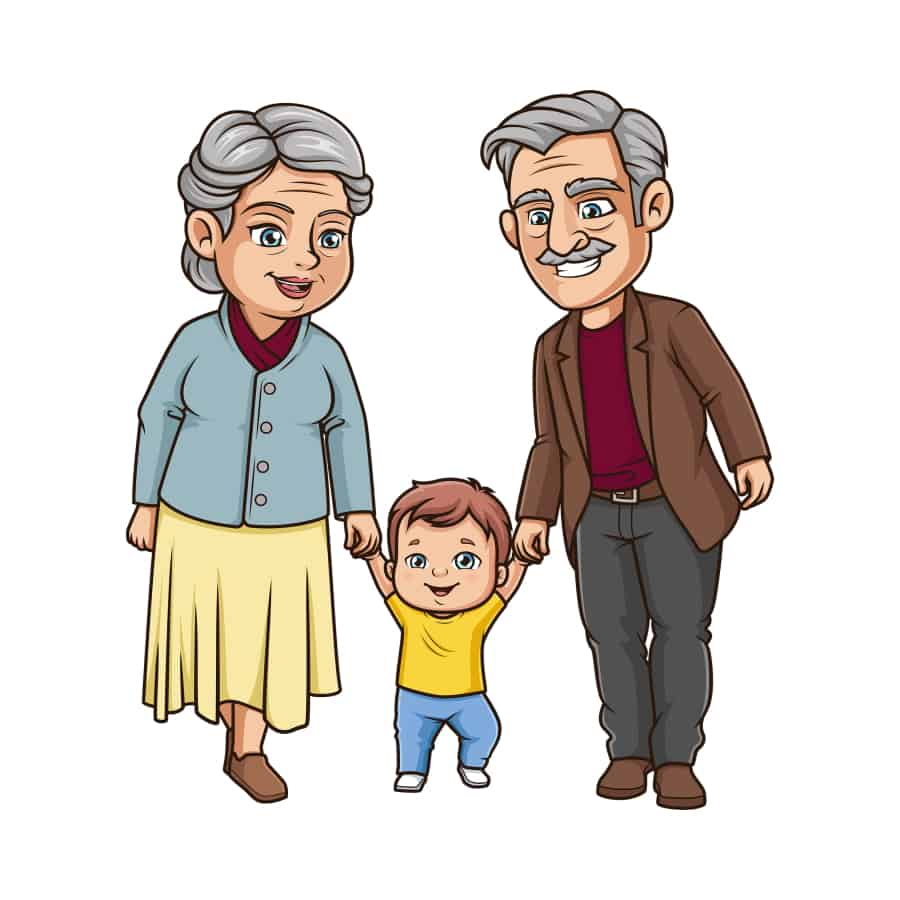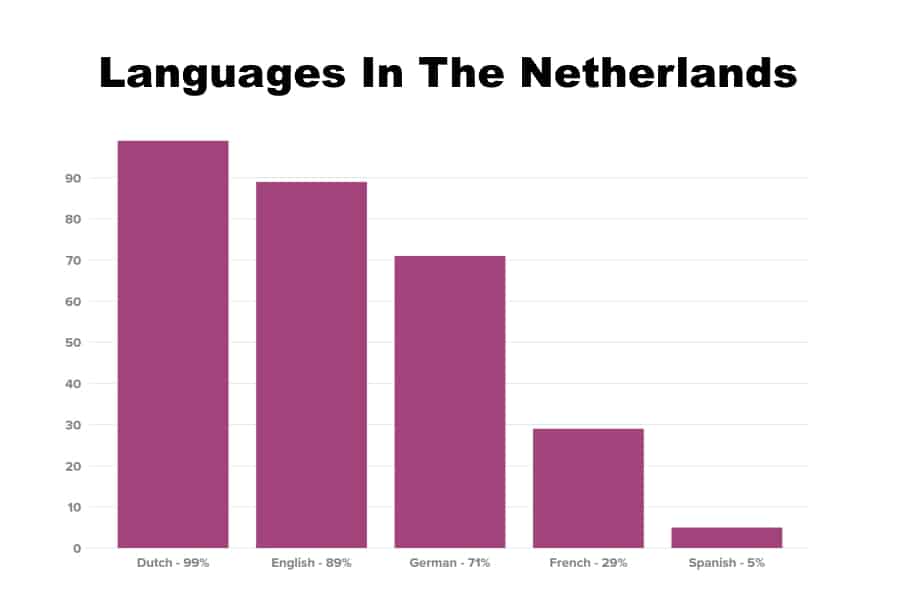Familiar names for grandparents and parents are common in many languages and cultures. Sometimes these names are made up words from children that can’t pronounce common ones. Other times they are in common use. So, what is the Oma and Opa meaning and what languages and cultures use them?
Oma and Opa are familiar names given to a grandparents in German. Oma is used for grandmother (die Großmutter) and Opa for grandfather (der Großvater). Being a West Germanic language, Dutch uses them in the same way. Korean has similar sounding words, but for mother, father, and older brother.
Let’s look at each of these cultures and how they use them a little closer. As a grandmother (Oma – Großmutter) and my husband being a grandfather (Opa – Großvater) with German heritage, we have a growing number of grandkids (Enkelkinder). Also when my husband was studying Korean, the first words he learned were family familiar names.

Contents
What Does Oma And Opa Mean In German?
For many little ones in Germany some of their favorite people besides their parents are their grandparents. As with most kids around the world they don’t call them by their proper names, and usually don’t simply use the equivalent of grandmother or grandfather. So, what do children in Germany call their grandparents?
In German, der Opa is a familiar name given to a grandfather or der Großvater. When talking about multiple grandpas it is die Opas. The diminutive form is das Opi. The German name for grandmother is die Großmutter and Oma in the familiar. The plural is die Omas and the diminutive is das Omi.
This is true of many kids, but of course not all. Some use unintelligible words that they came up with as toddlers. Many families see it as cute and go with it for many years. Others have cultural or religious connotations for grandparents.
In even some cases, there are specific nicknames that individual grandparents went by for a good portion of their lives that their grandkids picked up on and began using. These names can be personal to either or both.
Yet, there is also another way some may use oma and opa in a negative way.
We have all at one point or another heard someone refer to an elderly man or woman that may be moving or driving slowly with, “Hurry up grandpa!” This same usage occurs in German as well.
Though the word has a similar meaning, the intention is unkind or derogatory.
If you would like to read more about languages in Germany, I recommend my other articles…
What Does Oma And Opa Mean In Dutch?
With Dutch and German both being West Germanic languages, would this same meaning apply to grandparents in the Netherlands as well? There are similarities in the modern forms of each of these languages, but there are many differences as well. So, what does oma and opa mean in Dutch?
In Dutch, opa is said by grandchildren to their grandfather or grootvader. The plural version is opa’s. To use the diminutive form it is said as opaatje. The Dutch name given to a grandmother is grootmoeder and oma in the familiar. The plural is oma’s and the diminutive is omaatje.
With the Netherlands being home to so many bilingual speakers and the influence of other languages in the country being so strong, this makes for an environment where grandparent names can take other forms.
The Many Spoken Languages In The Netherlands Affects The Use Of Oma And Opa
There is one official language in the Netherlands, Dutch. It is spoken by 98% of the population and is the language of business, education, and entertainment.
Yet, the Dutch people are also known for being a highly bilingual society and culture. There are a great many people in the Netherlands that speak several of the other European languages found in neighboring countries.
The Netherlands has a high representation of English, German, French, And Spanish.
Let’s take a look at the percentages of the population that speak these other languages and then we can get an idea of what other names children may use for grandmas and grandpas.
| Languages Spoken In The Netherlands | Percentage Of The Population |
| Dutch | 98% |
| English | 89% |
| German | 71% |
| French | 29% |
| Spanish | 5% |
As you can see, with such large percentages of the population speaking these different languages, it is inevitable that many will be bilingual and even trilingual.
Though this is the case in many countries in Europe, it is more pronounced in the Netherlands with its high level of education, international shipping ports and airports, and large amounts of tourism.

The names given to family members by children can sometimes in these types of environments take on other forms due to the influences of other languages and their cultures. In all fairness, this can be the case in Germany as well. Yet, in Germany there is a very strong sense of the Germany language and culture.
Oma and opa in the Netherlands is a primary designation for grandparents due to Dutch and German usage. But there can be other terms from English, French, and Spanish that see some occurrences.
Other forms of familiar names given to grandparents in the Netherlands could be one of these more popular names in influential foreign languages of their neighboring countries…
| Influencing language | Familiar For Grandmother | Familiar For Grandfather |
| English | Nana (American) or Baba (British) | Papa (American) or Pop (British) |
| French | mémé | pépé |
| Spanish | lita/tita | lito/tito |
This is a similar situation with our family even though we all live in the overt monolingual society in the United States. Our son has three daughters, all of which use a traditionally American moniker for their mother’s parents.
Her parents are of Asian descent and come from Korea and Vietnam. Yet, the names they are called are the English grandpa and grandma. They chose these traditionally English names for themselves even though they were both born in other countries with their own native tongues.
On the other hand, due to my husband’s German heritage and my side of the family having some connections to it as well, we are called by the German oma and opa. We were both born and raised in the Southern United States in a very monolingual culture.
All of us living in the united states take inspiration in this way from many different influences. The same thing can happen in the Netherlands with even more opportunity for diversity.
If you liked this article and want to know more about languages in the Netherlands, see my other article here…
What Does Oma And Opa Mean In Korean?
These same sounds show up in the Korean language referring to parental figures, but not in the same way as in Dutch and German. Oma and opa, though they vary slightly in pronunciation, are names use by children in the home. If this is the case what do they mean to Korean families?
The Korean usage of oma is more precisely represented in the Romanized alphabet as eomma (엄마). It means mom in Korean as opposed to grandmother like in German and Dutch. Opa means older brother (oppa – 오빠) not grandfather and apa (ahppa – 아빠) means father.
The terms used for grandparents are quite different. In Korean the term for grandmother is Halmeoni (할머니), but for young children Halmi (할미). For grandfather the word is Halabeoji (할아버지) or the even more familiar for small children Hal-bi (할비).
Oma and opa (ahppa more precisely in Korean) are used in this immediate family context not in a direct contrast to the German and Dutch, but more in a happenstance.
Small children are taught to speak using limited vowels that they can easily pronounce. This combined with a limited set of consonant sounds as well, and you can see how similar words can form in languages even though one cannot claim influence over the other.
Another note here is pronunciation. For instance, the Korean version of mom is eomma with the emphasis on the last syllable. In German this word for grandma had the emphasis on the ‘oh’ sound at the beginning: Oma.
What Do World Cultures Call Grandparents Other Than Oma And Opa?
We see that there are at least three languages and cultures that use Oma and Opa as familiar names for either grandparents or other close family members. But what are other popular shortened versions used for grandparents in other countries?
Here I will list some of the names given to Grandpa and Grandma in the most populous countries and popular languages…
| Country | Official Languages | Grandpa | Grandma |
| China | Mandarin Chinese | Yé ye | Nǎi nai |
| India | Hindi – English | Dada / Nana | Dadi / Nani |
| Indonesia | Indonesian – Javanese | Kakek | Nenek |
| Pakistan | Urdu – English | Dada / Nana | Daadi / Naani |
| Brazil | Portuguese | Avô | Avó |
| Russia | Russian | dedushka (ded) | Babushka (baba) |
| Japan | Japanese | Ojiichan | Obachan |
| Philippines | Filipino – English | Lolo | Lola |
| Egypt | Arabic | Geddo | Teta |
| Turkey | Turkish | Dede | Anneanne / Babaanne |
As with all familiar terms, be careful when using them outside of extremely familiar contexts and some of them are normally reserved for small children. An example is the Russian familiar for grandma. It can be a derogatory term for a woman out of context.
One thing to notice here is the short forms and abbreviations that occur in most every language. It makes sense when you think about who is usually using these words. Young children as early as toddler ages call their grandparents by these names for the most part.
This is why we see oma and opa in such short forms in German, Dutch, and Korean. Little mouths and minds are trying to master the language and these short (and admittedly cute) little words make it a bit easier for them.
The Final Talking Point On Oma And Opa…
Though many may immediately tell you that oma and opa are German words, you now can see that Dutch and even Korean children use them as well.
Make sure to know the context and what the these familiar style words mean though. oma and opa have completely different meanings in Korean than in German and Dutch.
As well, in some cultures there really is not need for adults to use these words whereas in others it is fine in the right context. Just keep in mind the cultural norms and the proper meanings of the words and you will have no problem adding them to your vocabulary.
References
https://redtri.com/most-popular-nicknames-grandparents-in-us/
